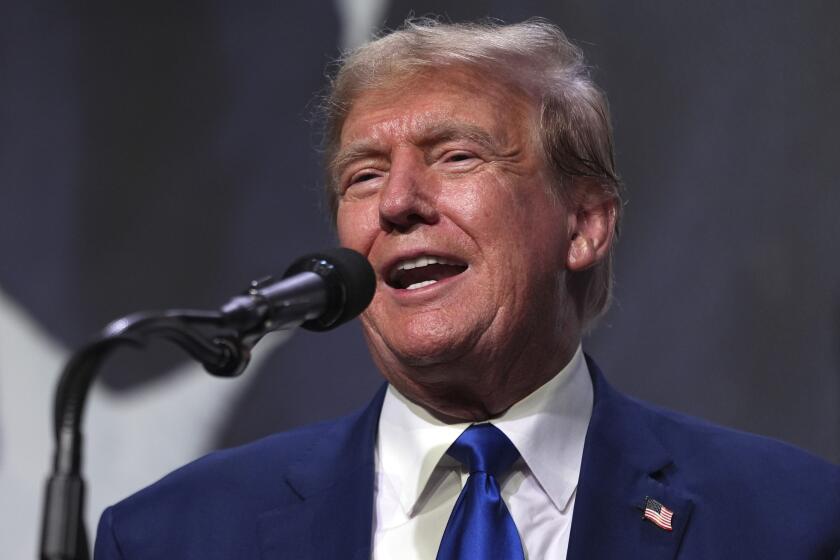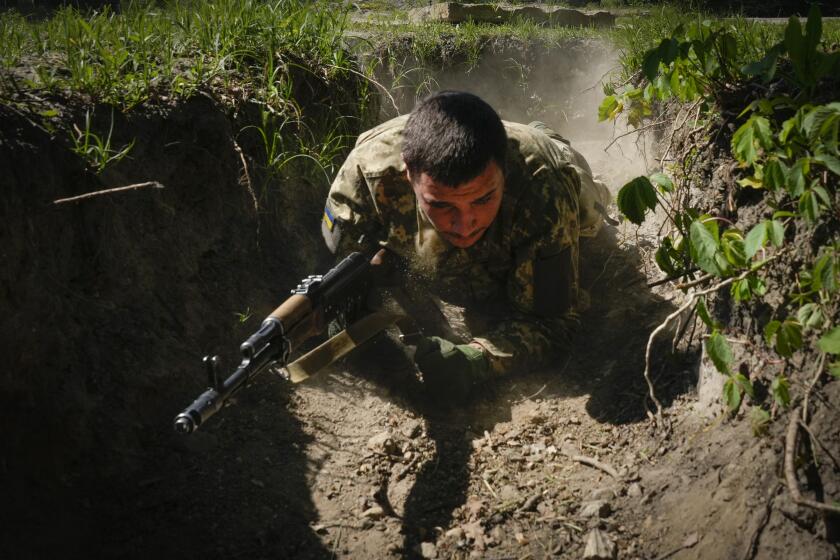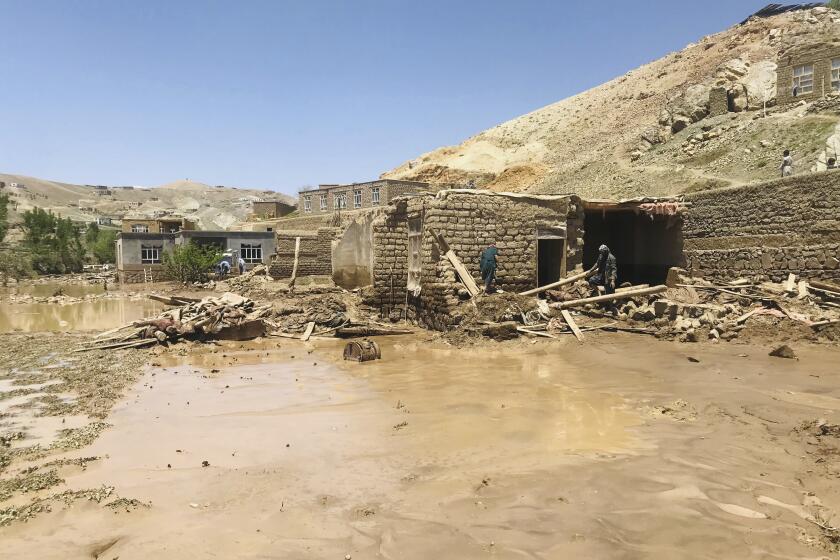New Philippine Congress Likely to Back U.S. Bases
President Corazon Aquino’s sweeping victory at the polls this week has brought to power a largely conservative national legislature that is likely to protect the future of America’s two large military bases here and take a hard line against the nation’s armed Communist insurgency.
The Filipino voters, who turned out in record numbers to show their support for Aquino’s congressional candidates, also rebuffed the first attempt by the political left to gain office by election since the 1940s.
And, despite a potentially violent protest campaign by Aquino’s principal opponent, ousted Defense Minister Juan Ponce Enrile, the generally peaceful and credible elections have driven yet another pillar of stability under Aquino’s embattled 15-month-old government.
Final official results have yet to be tabulated in the voting for a 24-member Senate and 200-seat House of Representatives. But reliable independent tallies make it clear that the outcome was also an enormous personal victory for President Aquino.
“Call it ‘Cory magic,’ ” Aquino’s exuberant press secretary, Teodoro Benigno, declared this week as the results showed all but one or two of Aquino’s handpicked 24-member senatorial slate winning in the at-large election.
An analysis of results in the Senate race confirms that Aquino was the biggest single factor in the election.
Aquino had barnstormed the country for nearly two months, pleading with voters to cast their ballots for all 24 of her candidates and promising that a healthy opposition would emerge from within her politically mixed coalition slate.
The moderate-right opposition, which challenged Aquino with a conservative coalition slate led by Enrile, had charged that Aquino was making the same error as the now-deposed President Ferdinand E. Marcos, who ruled for two decades through a combination of a cult of personality and dictatorial powers. And, appearing at a rally Thursday night outside a Manila military camp, Enrile again charged that the government had won by cheating.
“When you look at the results, though, it’s pretty clear that a huge majority believed Cory and simply voted straight ticket,” said Paul Aquino, the president’s brother-in-law and national campaign chairman for her “people power” coalition. “The voters know Cory. They know she’s not Marcos.”
Sees Victory for Center
But political analyst Amando Doronila concluded Thursday that the election was not only a victory for Aquino but for the “forces of the political center” as a whole.
“The rout of (Enrile’s) Grand Alliance for Democracy . . . and the exclusion of the left from the Senate disclose the strength and depth of the center tendency in Philippine politics,” Doronila said.
“And if the center is showing great strength in these elections, it is because it has been swelled by conservatives who find comfort in the shift to the right of the Aquino government, especially its intensification of the counterinsurgency campaign.”
Paul Aquino insisted, however, that the ruling party’s Senate--a largely ceremonial body whose greatest power lies in its authority to approve or reject foreign treaties such as the agreement on U.S. military bases--will, as the president promised, have a built-in opposition.
Three of its members--Wigberto Tanada, Augusto Sanchez and Sotero Laurel--”will definitely be for total abrogation of the U.S. treaty,” Aquino said. “On the other side you have (Ernesto) Maceda, who will say, ‘Let’s just give it to the Americans.’ And the rest of them will say, ‘Let’s see the money. Let’s see the color of the money.’ ”
The bilateral agreement that permits the United States to maintain Clark Air Base and Subic Bay Naval Base north of Manila, Washington’s largest military facilities outside North America, expires in 1991. President Aquino has pledged to honor the agreement; negotiations on the future of the bases are to begin next year.
May Alienate Right, Left
In winning so sweeping a victory, though, Aquino risks alienating the forces of both the extreme left and the extreme right. Those are the most heavily armed groups in the country, and neither believes it is represented in the new legislature. In the short term, Aquino may face a wave of street protests similar to those in Marcos’ final years.
Campaign director Aquino and other top presidential aides, as well as intelligence sources in the Philippine military, conceded that Aquino already is paying a political price for her landslide victory. And that price may go up in the coming weeks, if Enrile enlists support for his protest within the armed forces.
With the final results still unknown, Enrile and his supporters this week launched an all-out protest apparently aimed at bringing down the Aquino government. Charging that the administration was rigging the results in the counting, Enrile on Thursday stationed 25,000 screaming demonstrators, many of them Marcos loyalists, on the boulevard outside the same military camp where Enrile staged the February, 1986, revolt that drove Marcos from power.
Revealing his own deep concern about Enrile’s continuing personal popularity within the armed forces, which voted overwhelmingly for Enrile’s coalition and against Aquino in Monday’s poll, the armed forces chief of staff, Gen. Fidel V. Ramos, issued stern warnings to military personnel Thursday.
Ramos Alerts Commanders
Ramos ordered his 200,000-member military not to join Enrile’s rally. Later, he threatened “administrative action” against any soldiers who did attend, and he ordered his regional field commanders to be alert for “unauthorized troop movements.”
Last November, Ramos similarly secured the country the day before the president fired Enrile, who was then Ramos’ superior, amid rumors that his military supporters were about to stage another coup attempt against the Aquino government.
During the Enrile rally Thursday, however, it appeared that the opposition leader’s strategy will fail. Although demonstrators shouted, “Join us, join us!” to the soldiers inside Camp Aguinaldo, none of the troops responded.
Nonetheless, military authorities have announced that several senior officers who participated in previous coup attempts against Aquino “have gone underground,” making them potentially desperate and dangerous foes. And Thursday morning, Ramos placed Manila’s four largest military bases on alert, ordering commanders to “monitor, stop and investigate any unauthorized groups or movements and account for your men, vehicles, firearms and other resources.”
One of the renegade officers, Col. Rolando Abadilla, who was chief of police intelligence in Manila under Marcos and the personal bodyguard of his son, Ferdinand E. Marcos Jr., is believed to have access to more than 500 firearms that disappeared when Marcos fled to Hawaii last year.
‘Nightmare’ of a Sweep
“I told you before the election that my biggest nightmare was we’d win 23 or 24 of the Senate seats,” Paul Aquino told The Times as the returns came in this week. “And now I’m living my nightmare.
“It’s the same as the Democrats or the Republicans winning every seat in the U.S. Congress and Senate. People have a hard time believing it. And now we do face these problems from the losing ends of the political spectrum. But I don’t think the problems will last longer than three or four weeks at the most.
“The key question is, how many military people believe the election was fraudulent? They were in charge of it, working at the polls. They know. The answer is, not that many think there was a problem.”
The political left, which similarly fielded a full slate of Senate candidates under a coalition called the Alliance for New Politics, also denounced the elections as fraudulent. But it has yet to launch a protest campaign, and several political analysts said none is likely until after the local elections scheduled for August.
Left Seeks Local Offices
“If you’re looking for credibility in the August elections, you’re going to make sure this process works,” said Christian Monsod, chairman of the citizens’ poll-watching group, the National Movement for Free Elections, who added that the leftists are likely to be more successful getting mayors and governors into office in regions where their mass base and the Communist New People’s Army insurgents are strong.
Monsod added that, of the 230 complaints of election irregularities that his group received this week, only four mentioned the New People’s Army, which was active in stealing ballot boxes, raiding military camps and ambushing patrols as destabilization tactics during elections under Marcos.
Among Aquino’s conservative presidential advisers, there was jubilation this week over the left’s poor showing, not only in failing to win a single Senate seat but also in its few successes in the locally elected House races as well.
In addition, most of the Senate and House members elected by the 25 million Filipino voters are staunch anti-Communists, many of them conservative, veteran politicians who were prominent before Marcos came to power in 1965.
Sees Rejection of Left
“It shows that the Filipino people are just not ready for this ideology of the left,” said Lupita Kashiwahara, Aquino’s sister-in-law and one of the administration’s key strategists.
Aquino’s aides, chief among them Jaime Ferrer, her stridently anti-Communist secretary of local governments, are now hoping that the election results alone will help alienate the radical left from a mass political base that the left numbers at more than 4 million nationwide.
But, in a detailed analysis of the results of the contest for the lower house, in which Aquino’s candidates appeared headed for a 60% majority in the U.S.-style House of Representatives, it appeared that there was little ideology involved in the vote.
Filipino voters cast their ballots largely along traditional, feudal lines in keeping with the country’s clannish, family-based old politics.
Former cronies and Cabinet ministers of Marcos, some of them facing criminal charges ranging from graft to murder, won House seats by huge margins, simply because they are still viewed as the local clan chiefs in the country’s underdeveloped rural provinces.
Defendant a Winner
Jose Aspiras, for example, who was Marcos’ tourism minister and is now among those charged in the 1983 assassination of the current president’s husband, Benigno S. Aquino Jr., won handily in the northern province of La Union, where he is still venerated.
In the province of Pangasinan north of Manila, not only did Conrado Estrella Jr., the son of Marcos’ former land reform minister, win, but so did his grandson, Conrado Estrella III, simply because the family has been a local political dynasty for decades.
The House voting also reflected what Cesar Virata, a top Philippine economic analyst and one-time prime minister under Marcos, predicted last year would be “a change in ruling clans--from the new clans that Marcos brought in back to the old oligarchs” who were in power when Marcos won by a similar landslide victory in 1965.
All seven of the president’s close relatives who ran for House and Senate seats appeared to be sure winners, according to Thursday’s unofficial returns. Aquino’s younger brother, Jose Cojuangco Jr., won easily in the family’s home province of Tarlac, where the family owns a 12,000-acre feudal estate that is home to thousands of tenant farmers.
One of the biggest House winners was Aquino’s sister-in-law, Tessie Aquino Oreta, who ran in a Manila slum suburb where one of her impoverished supporters commented during the campaign, “Why go for anybody else when Tessie is already in the president’s kitchen?”
Surprised at Results
In assessing the strong showing by pro-administration House candidates, one foreign diplomatic observer here expressed surprise.
“You’d think that after 15 years of dictatorship, these people would never vote a straight ticket again,” said the source, asking anonymity. “They should know what that sort of thing leads to.”
But one top Aquino campaign aide, also asking not to be identified by name, added: “It’s really very simple. After 15 years, the Filipino voter has been conditioned just to follow. This will take years to undo.”
Despite the president’s apparent overall victory in the House, aides such as Paul Aquino readily conceded that the administration could easily lose its majority through the political realignments that are expected after Congress convenes.
Many of the House candidates had privately conceded during the campaign that they sought the president’s endorsement only to take advantage of “the skirt-tail effect” of Aquino’s enormous personal popularity. After the election, one candidate confided, “It’s every man and every woman for themselves.”
Senate Fights Expected
Similar fights are expected in the Senate, the biggest one over the Senate presidency. The post will probably go to the leader of one of the five political parties represented in Aquino’s coalition, and there is much at stake. Whoever wins the Senate presidency is likely to become the front-running successor to Aquino in a presidential election scheduled for 1992, an election in which Aquino has said she will not run.
More to Read
Start your day right
Sign up for Essential California for news, features and recommendations from the L.A. Times and beyond in your inbox six days a week.
You may occasionally receive promotional content from the Los Angeles Times.






